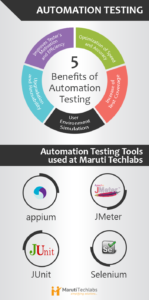Testing is one of the make-or-break stages of the software development life cycle, as efficient testing determines the quality of the software. With the rising demand for ‘faster delivery of quality software, businesses are adopting DevOps and agile software development methodology.
And adopting DevOps requires the knowledge of automation testing to increase the effectiveness, efficiency and coverage of your software testing. Automation testing is the management and performance of test activities, including developing and executing test scripts to verify test requirements using an automation testing tool.
It helps in the comparison of actual outcomes with predicted outcomes. Thus, automation testing has become an indispensable part of quality assurance.

BENEFITS OF AUTOMATION TESTING
1. Optimization of Speed and Accuracy
Once the tests are documented, automation testing takes less time than corresponding manual testing. For thorough and frequent execution, manual testing takes more time on more extensive systems. Test automation is a way to make the testing process extremely efficient.
The testing team can be strategically deployed to tackle the tricky, case-specific tests. At the same time, the automation software can handle the repetitive, time-consuming tests that every software has to go through. This results in improved accuracy as automated tests perform the same steps precisely every time they are executed and create detailed reports. Thus, it’s a great way to save up on time, money, and resources and generate a high ROI.
2. Improves Tester´s Motivation and Efficiency
Manual testing can be mundane, error-prone and therefore, become exasperating. Test automation alleviates testers’ frustrations and allows the test execution without user interaction while guaranteeing repeatability and accuracy. Instead, testers can now concentrate on more difficult test scenarios.
3. Increase in Test Coverage
Automated software testing can increase the depth and scope of tests to help improve software quality. Lengthy tests can be run on multiple computers with different configurations. Automated software testing can examine an application and investigate memory contents, data tables, file contents, and internal program states to determine if the product is behaving as expected.
Automated software tests can efficiently execute thousands of complex test cases during a test run, providing impossible manual tests. Testers freed from repetitive manual tests have more time to create new automated software tests and deal with complex features.
4. Upgradation and Reusability
The testing script in the software is reusable, which has many subsequent benefits. With every new test and bug discovery, the testing software directory can be upgraded and kept up to date. Thus, even though test automation looks expensive in the initial period, one has to realise that automation software is a long-lasting, reusable product that can justify its cost.
5. User Environment Simulation
Automation testing is used to simulate a typical user environment using categorically deployed mouse clicks and keystrokes. This serves as a platform for future testing scenarios. In-house automated software is modelled such that they have enough flexibility to handle a unique product while complying with the latest security and testing protocols.
This makes test automation a powerful tool for time-saving, resourceful, and top-notch results. For example, with automation testing, a time-consuming and redundant procedure such as GUI testing becomes very easy.
AUTOMATION TESTING TOOLS
Selenium
Selenium is a popular automated web testing tool and helps you to automate web browsers across different platforms. Quite popular among the prominent browser vendors, Selenium is a native part of their browsers. Webdriver is the latest version of selenium with improved functional test coverage, like the file upload or download, pop-ups, and dialogues barrier.
WebDriver is designed in a more straightforward and more concise programming interface and addresses some limitations in the Selenium API. Selenium, when used with Hudson, can be used for Continuous integration.
JMeter
JMeter is an Open Source testing software. Java application is designed to cover categories of tests like load, functional, performance, regression, etc., and it requires Java Development Kit(JDK) 5 or higher. JMeter may be used to test performance both on static and dynamic resources such as Web Services (SOAP/REST), Web dynamic languages (PHP, Java, ASP.NET), Java Objects, Databases and Queries, FTP Servers, etc.
It can be used to simulate a heavy load on a server, group of servers, network, or object to test its strength or to analyse overall performance under different load types. It provides a graphical analysis of performance or tests your server/script/object behaviour under heavy concurrent load.
Appium
Appium is an open-source tool for automating native, mobile web, and hybrid applications on iOS and Android platforms. Appium is a “cross-platform, “ allowing you to write tests against multiple platforms (iOS, Android) using the same API. This enables code reuse between iOS and Android test suites.
Appium is built on the idea that testing native apps shouldn’t require an SDK or recompiling your app and should be able to use your preferred test practices, frameworks, and tools.
JUnit
JUnit is a simple unit testing framework to write repeatable tests in Java. JUnit is one of the standard testing frameworks for Java developers and instrumental in test-driven development. Similarly, NUnit is a unit-testing framework for all.
Net languages and one of the programs in the xUnit family. It was initially ported from JUnit to .NET and redesigned to take advantage of many .NET language features.
Testing is the backbone of every software delivery cycle. The detection and prevention of defects is a significant challenge for the testing team in the software industry.
A large portion of the software development cost consists of error removal and re-working on projects. Early detection of defects requires quality control activities throughout the product life cycle. This calls for the adoption of DevOps and Automation Testing.
At Maruti Techlabs, we follow test automation best practices and use enterprise-grade tools and software for efficient implementation. Get in touch with us to simplify not only your testing process but the entire software development cycle.

